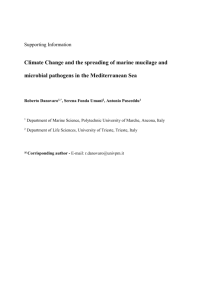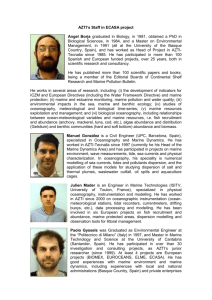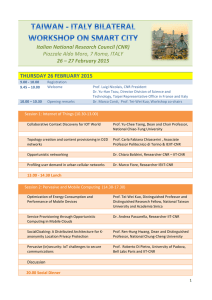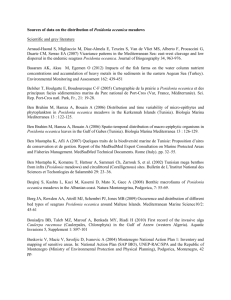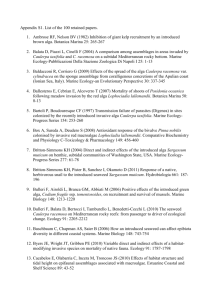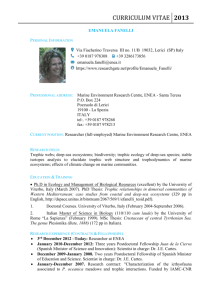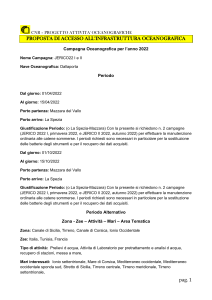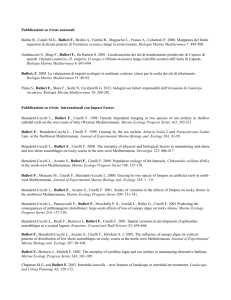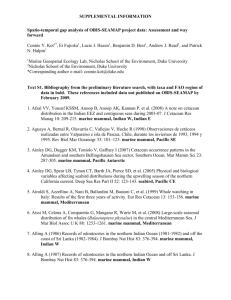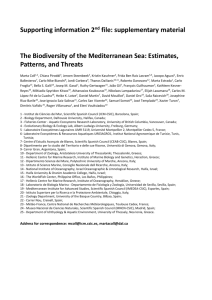ismar - efaro
advertisement
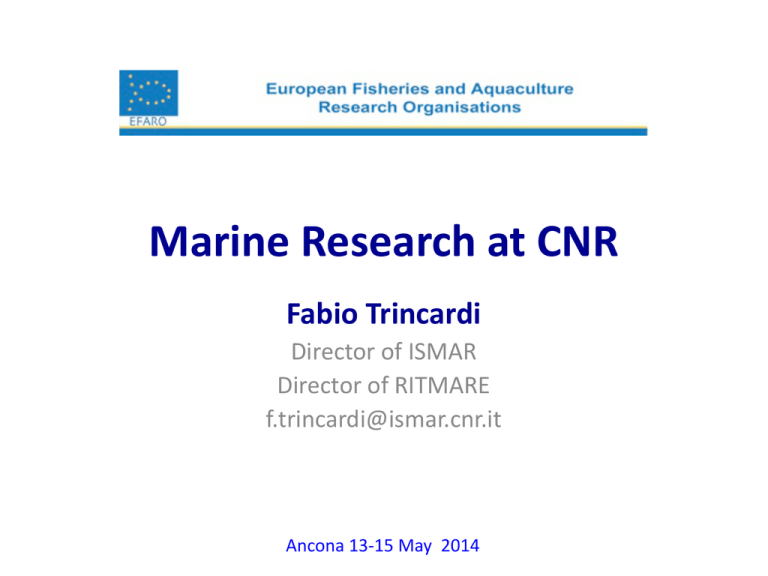
Marine Research at CNR Fabio Trincardi Director of ISMAR Director of RITMARE f.trincardi@ismar.cnr.it Ancona 13-15 May 2014 CNR scientific network − 9000 Permanent staff – Turnover 1.1 Billion − 7 Macro-Areas (Departments): • Earth System Sciences - Environmental Technologies • Bio-Agrifood Sciences • Biomedical Sciences • Chemistry - Materials Technologies • Physical Sciences - Technologies of the Matter • Engineering - ICT - Energy and Transport Technologies • Human and Social Sciences - Cultural Heritage − 107 Research Institutes performing research activities and developing capabilities − 20 Research Centres 2 International Challenges Scientific base in the Artic Polar Circle ISIS - Science and Technology Facilities Council (Oxford, UK) Virtual Museum (Iraq) ILL - Institut Max Von Laue – Paul Langevin (Grenoble, France) ESRF - European Synchrotron Radiation Facility (Grenoble, France) Urania EVK2 Everest Project (Nepal) Italian Scientific Base in Antartic 3 Earth System Science and Environmental Technologies • 13 affiliated institutes • Macro areas – – – – Climate research, Environmental systems, Marine research, Natural and anthropogenic risks 4 CNR’s main Institutes performing marine research ISMAR IAMC IREA IGG ISSIA INSEAN IGAG ISAC CNR MARINE OBSERVING SYSTEM … … AND THE FLEET • Pubblic Research Institute • Headquarter in Venice and 6 regional sections • 180 Permanent Staff; • About 60 people in training (PhD, postdoctoral) • About 160 ISI publications each year ISMAR was evaluated as the excellence institute of the Earth System Science Department of CNR 2010 1946 CNR's mission is to increase the knowledge of natural processes and help to solve society's problems: • Natural processes (geological, oceanographic, biological), dispersion of sediments and pollutants, ecosystems, productivity of the seas, natural hazards. • Mechanisms / effects of global change heating and ocean circulation, acidification, sea level change and coastal erosion, hydrodynamic processes (including polar regions) • Human impacts current and pre-industrial pollution, impacts on the coasts and in the deep sea, exploitation of resources, alien species • Coordination of EU Projects – EURODELTA (Evoluzione “storica” dei delta del Mediterraneo e Mar Nero) – EMMA (Impatti antropici sui sistemi costieri) – NEAREST (Sviluppo di un sistema di allerta Tsunami in Mediterraneo) – SARDONE (Pesca sostenibile dei piccoli pelagici) Immagine ROV Urania Credit: Marco Taviani Networking within DTA EUROFLEET 1 E 2 JERICO SEADATANET EMODNET DSS FISHERIES RITMARE – ENVEUROPE (Costruzione rete LTER Europa) – COCONET (Aree Marine Protette Mediterraneo e Mar Nero) – DISCATCH (Riduzione del “bycatch” legato alla pesca) – TARTLIFE (Preservazione delle tartarughe in Mediterraneo) – GHOST (Impatto delle reti fantasma sulla biologia) – ADRIPLAN (Pianificazione Spazio Marittimo, ambito EUSAIR) • Participation to EU Projects – Several tens The ISMAR marine observing system - Fixed buoys - Re-deployable mooring stations - Repeated transects - Fishery observing system - Satellite - Radar - Real time data transmission - Interoperable data structures - Long Term Ecological Research - Modeling and forecast C01 C02 Argos NOREK 6020 Argos RDI WH300 RCM9 RCM9 SBE39 RCM9 RCM9 SBE37 RCM9 2 Rels. 2 Rels. http://www.ismar.cnr.it/infrastrutture/piattaforma-acqua-alta CNR’s Institutes performing research in marine geology ISMAR Venice and Bologna IAMC Napoli IGG Padua IGAG Roma RESEARCH IN THE OCEANS GEOLOGICAL HAZARDS Submarine landslides in the Mediterranean Predisposing factors? Recurrence? What impact on human structures? Camerlenghi, Urgeles e Fantoni, 2009 IMPROVE THE KNOWLEDGE OF THE DEEP SEA “…it would be of very good use to have natural maps of the earth […] every Prince should have such a draught of his own country and dominions…” Thomas Burnet, Telluris Theoria Sacra (1684-1689) CNR-ISMAR Database •SB Atlas Deso25 •Reson 8160 (50 kHz) •Konsberg EM300 (30 kHz) •Kongsberg EM710 (70–100 kHz) •Konsberg EM3000 (300 kHz) • Konsberg EM3002 (293 kHz, 300 kHz, 307 kHz) • Reson 8125 (455 kHz) •Geoswath Plus (500 kHz) EMODnet - Central Mediterranean sea DTM Regional Coordinator CNR’s Institutes performing research on Coastal systems and human impacts ISMAR Venice Ancona, Lesina, Genova and Bologna IAMC Napoli, Taranto, Capo Granitola IGG Padua IGAG Roma COASTAL AND CRUISE TOURISM & HUMAN PRESSURES RECONCILING ENVIRONMENT, LANDSCAPE AND CULTURAL HERITAGE THE NORTHERN ADRIATIC A LOW LAND DOMINATED BY SUBSIDENCE • TECTONIC (THERMAL, FLEXURAL) • SEDIMENT LOAD • SEDIMENT COMPACTION • PEAT DECOMPOSITION • WATER WITHDRAWAL • OIL & GAS DEM of the North Adriatic coast EFFECTS of SEA LEVEL RISE • Destruction of coastal wetlands • Inundation and erosion of beaches and barrier islands • Saltwater intrusion (salinization of soils - desertification) • Flooding CNR’s Institutes performing research on marine biology and resources ISMAR Ancona Lesina, Venice, and Genoa IAMC Messina, Capo Granitola, Mazara del Vallo Sustainable use of marine resources Assessing the status of biotic resources in the Mediterranean • Natural change • Anthropogenic pressures – fisheries – aquaculture and mariculture • • • • Stock shrinking Loss of biodiversity Loss of large predators Spread of alien species Roma, 5 December 2013 European Strategy for Blue Growth Conditions for a Blue Economy in the Mediterranean Federazione del Mare Italian Maritime Cluster Sustainable use of marine resources Fishing Down the Food Web…. Trophic chain erosion Trophic levels 5 4 3 2 90% Mediterrenean top predators lost in last 100 year Sustainable use of marine resources Life in a Changing Ocean Roma, 5 December 2013 European Strategy for Blue Growth Conditions for a Blue Economy in the Mediterranean ©Bob Cranston Federazione del Mare Italian Maritime Cluster Knowledge of life cycles and ecology of the commercial species allows to identify critical period and habitat necessary to species to complete their different life stages. • The classical sketch of stock dynamics in space Spawning Areas Nursery Areas Feeding Areas CNR’s Institutes performing research in Physical oceanography ISMAR Venezia, Trieste, Ancona, La Spezia, Bologna and Genoa IAMC Oristano and Mazara del Vallo ISAC Roma NETTUNO WAVE FORECASTING KASSANDRA WAVES, SEA LEVEL, CURRENTS ISMAR -CENTRO MAREE HIGH WATERS IN VENICE (http://gisportal.insula.it) LIW salty, NAdDW cold After Lascaratos, 1999 LIW The Mediterranean “concentration basin” RAPID ENVIRONMENTAL ASSESSMENTS CNR-ISMAR Database © ARCADIA 2010-CNR/ISPRA Il mare Adriatico è un mare dove avviene la formazione di acqua densa, profonda e di fondo Hindcast modeling activity Adriatics Sea @ 1 Km resolution movie Note per Fabio, 28/04/2014 A.Bergamasco 36 Area of major interest: Hindcast modeling @ 1 km resolution “cascading events” Note per Fabio, 28/04/2014 A.Bergamasco 37 CNR’s Institutes performing research in Marine and maritime technology ISMAR Venezia, Ancona and Genoa IAMC Capo Granitola INSEAN Roma IREA Milano ISSIA Genova We need an holistic and shared knowledge of the “use of the sea” • Approach similar to the land use maps on land (MSP) • Exploiting all new mapping techniques and GIS visualizations • Become aware of all human impacts (visible or not) • So far, individual "stakeholders" know the piece of reality they are most interested in (lack of integration) Sustainable use of marine resources Marine Habitat Mapping Roma, 5 December 2013 European Strategy for Blue Growth Conditions for a Blue Economy in the Mediterranean Federazione del Mare Italian Maritime Cluster HABITAT MAPPING IN SHALLOW WATER 20/05/2014 Marine Protected Areas • There are many MPAs in the Mediterranean, whereas they are rare in the Black Sea • There are no Off Shore Wind Farms in both basins • A co-ordinated policy of marine protection is lacking Renewable resources and sea uses • Temperature Ocean thermal energy conversion (OTEC) • Tides Important contribution to energetic needs (20% in UK) • Waves Energy production for less than 10 dollar cents/kWh • • • • Currents Wind Biomass Sun WHAT ARE THE IMPACTS ON BIODIVERSITY AND MARINE ECOSYSTEMS? HOW THESE ACTIVITIES COULD BE ENVIRONEMENT SUSTAINABLE? ADRIPLAN Contribution Commonly-agreed approach to crossborder MSP in the AIM, considered as a whole (Pan-AIM view) and more specifically through two Focus Areas MSP priorities based on the best knowledge available Concrete Planning and Management options on Focus Areas and specific problems Recommendations for the implementation of cross-border MSP in the AIM and other regions of the Mediterranean Compatibilità, conflitti e sinergie potenziali fra usi del mare e della fascia costiera ed ecosistemi marini Thank you very much Some challenges of the coming years … Reconstruct the historical evolution of the coastal area (and human impacts) Study of the oceanographic processes and the impact on the seabed (coast, continental shelf and deep sea) Oceanographic forecasting models (waves, tides, currents) Observing sites, long time physical and ecological series Human impacts on seafloor, water column and biological resources (from the lagoons to the ocean) Definition of the geological hazards: identification of structures (3D Seismic Geomorphology), fluids emissions
